
Zora Neale Hurston was born on January 7, 1891, in Notasulga, Alabama, though she soon after moved to Eatonville Florida, and she’s a difficult person to describe by titles alone. Though she’s most famous for her novel, Their Eyes Were Watching God, she was also a researcher, anthropologist, playwright, filmmaker, a pillar of the Harlem Renaissance, and the wearer of countless other equally impressive intellectual hats. Hurston’s writings and research focused primarily on racial tensions in the southern U.S. states as well as African American and Caribbean cultures.
As is the tragedy that befalls many great minds and talents, when Hurston died on January 28, 1960, she did so penniless and in obscurity. Her writings, including manuscripts and letters, were ordered to be burned after her death, and they were saved only when a friend of Huston’s happened to walk by and douse the flames. Many of the documents suffer from both fire and water damage, though the public is able to view them where they’re currently being preserved and housed by the University of Florida George A. Smathers Libraries.
In fact, UF is currently hosting a National Endowment of the Arts (NEA) Big Read in honor of Their Eyes Were Watching God. The series of events started back in September 2024, but the livestream from their kick-off event, hosted by archivists and the source of the information seen here, is available for viewing on YouTube. There’s also still time to catch other events in the series like the NEA Book Talk: Their Eyes Were Watching God on January 15 from 5:00 p.m. to 6:30 p.m. at the Headquarters Library.
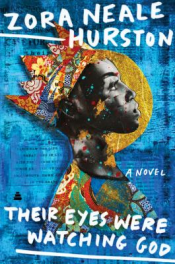
Fair and long-legged, independent and articulate, Janie Crawford sets out to be her own person—no mean feat for a black woman in the '30s. Janie's quest for identity takes her through three marriages and into a journey back to her roots.
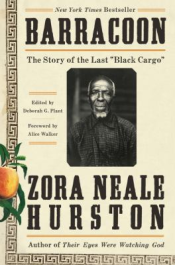
Barracoon: The Story of the Last “Black Cargo”
In 1927, Zora Neale Hurston went to Plateau, Alabama, just outside Mobile, to interview eighty-six-year-old Cudjo Lewis. Of the millions of men, women, and children transported from Africa to America as slaves, Cudjo was then the only person alive to tell the story of this integral part of the nation's history. Hurston was there to record Cudjo's firsthand account of the raid that led to his capture and bondage fifty years after the Atlantic slave trade was outlawed in the United States. In 1931, Hurston returned to Plateau, the African-centric community three miles from Mobile founded by Cudjo and other former slaves from his ship. Spending more than three months there, she talked in depth with Cudjo about the details of his life. During those weeks, the young writer and the elderly formerly enslaved man ate peaches and watermelon that grew in the backyard and talked about Cudjo's past--memories from his childhood in Africa, the horrors of being captured and held in a barracoon for selection by American slavers, the harrowing experience of the Middle Passage packed with more than 100 other souls aboard the Clotilda, and the years he spent in slavery until the end of the Civil War. Based on those interviews, featuring Cudjo's unique vernacular, and written from Hurston's perspective with the compassion and singular style that have made her one of the preeminent American authors of the twentieth-century, Barracoon masterfully illustrates the tragedy of slavery and of one life forever defined by it. Offering insight into the pernicious legacy that continues to haunt us all, black and white, this poignant and powerful work is an invaluable contribution to our shared history and culture.
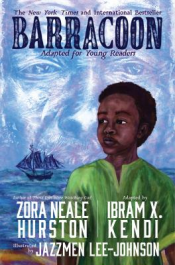
Barracoon: Adapted for Young Readers
In the first middle grade offering from Zora Neale Hurston and Ibram X. Kendi, young readers are introduced to the remarkable and true-life story of Cudjo Lewis, one of the last survivors of the Atlantic human trade, in an adaptation of the internationally bestselling and critically acclaimed Barracoon . This is the life story of Cudjo Lewis, as told by himself. Of the millions of men, women, and children transported from Africa to America to be enslaved, eighty-six-year-old Cudjo Lewis was then the only person alive to tell the story of his capture and bondage—fifty years after the Atlantic human trade was outlawed in the United States. Cudjo shared his firsthand account with legendary folklorist, anthropologist, and writer Zora Neale Hurston. Adapted with care and delivered with age-appropriate historical context by award-winning historian Ibram X. Kendi, Cudjo’s incredible story is now available for young readers and emerging scholars. With powerful illustrations by Jazzmen Lee-Johnson, this poignant work is an invaluable contribution to our shared history and culture.

Dust Tracks on a Road: An Autobiography
From Zora Neale Hurston, one of the most important African American writers of the twentieth century, comes her riveting autobiography—now available in a limited Olive Edition.
First published in 1942 at the height of her popularity, Dust Tracks on a Road is Zora Neale Hurston's candid, funny, bold, and poignant autobiography—an imaginative and exuberant account of her childhood in the rural South and her rise to a prominent place among the leading artists and intellectuals of the Harlem Renaissance.
As compelling as her acclaimed fiction, Hurston's very personal literary self-portrait offers a revealing, often audacious glimpse into the life—public and private—of an extraordinary artist, anthropologist, chronicler, and champion of the Black experience in America. Full of the wit and wisdom of a proud, spirited woman who started off low and climbed high, Dust Tracks on a Road is a rare treasure from one of literature's most cherished voices.
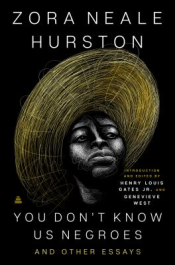
You Don’t Know Us Negroes: And Other Essays
One of the most acclaimed artists of the Harlem Renaissance, Zora Neale Hurston was a gifted novelist, playwright, and essayist. Drawn from three decades of her work, this anthology showcases her development as a writer, from her early pieces expounding on the beauty and precision of African American art to some of her final published works, covering the sensational trial of Ruby McCollum, a wealthy Black woman convicted in 1952 for killing a white doctor. Among the selections are Hurston's well-known works such as 'How It Feels to be Colored Me' and 'My Most Humiliating Jim Crow Experience.' The essays in this essential collection are grouped thematically and cover a panoply of topics, including politics, race and gender, and folkloric study from the height of the Harlem Renaissance to the early years of the Civil Rights movement. Demonstrating the breadth of this revered and influential writer's work, You Don't Know Us Negroes and Other Essays is an invaluable chronicle of a writer's development and a window into her world and time
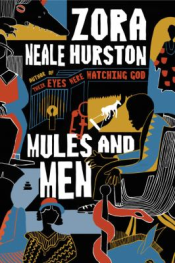
Mules and Men is the first great collection of black America's folk world. In the 1930's, Zora Neale Hurston returned to her "native village" of Eatonville, Florida to record the oral histories, sermons and songs, dating back to the time of slavery, which she remembered hearing as a child. In her quest, she found herself and her history throughout these highly metaphorical folk-tales, "big old lies," and the lyrical language of song. With this collection, Zora Neale Hurston has come to reveal and preserve a beautiful and important part of American culture.
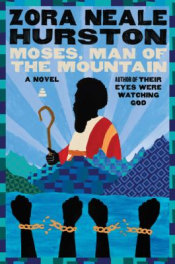
In this 1939 novel based on the familiar story of the Exodus, Zora Neale Hurston blends the Moses of the Old Testament with the Moses of black folklore and song to create a compelling allegory of power, redemption, and faith. Narrated in a mixture of biblical rhetoric, black dialect, and colloquial English, Hurston traces Moses' life from the day he Is launched into the Nile river in a reed basket, to his development as a great magician, to his transformation into the heroic rebel leader, the Great Emancipator. From his dramatic confrontations with Pharaoh to his fragile negotiations with the wary Hebrews, this very human story is told with great humor, passion, and psychological insight--the hallmarks of Hurston as a writer and champion of black culture.